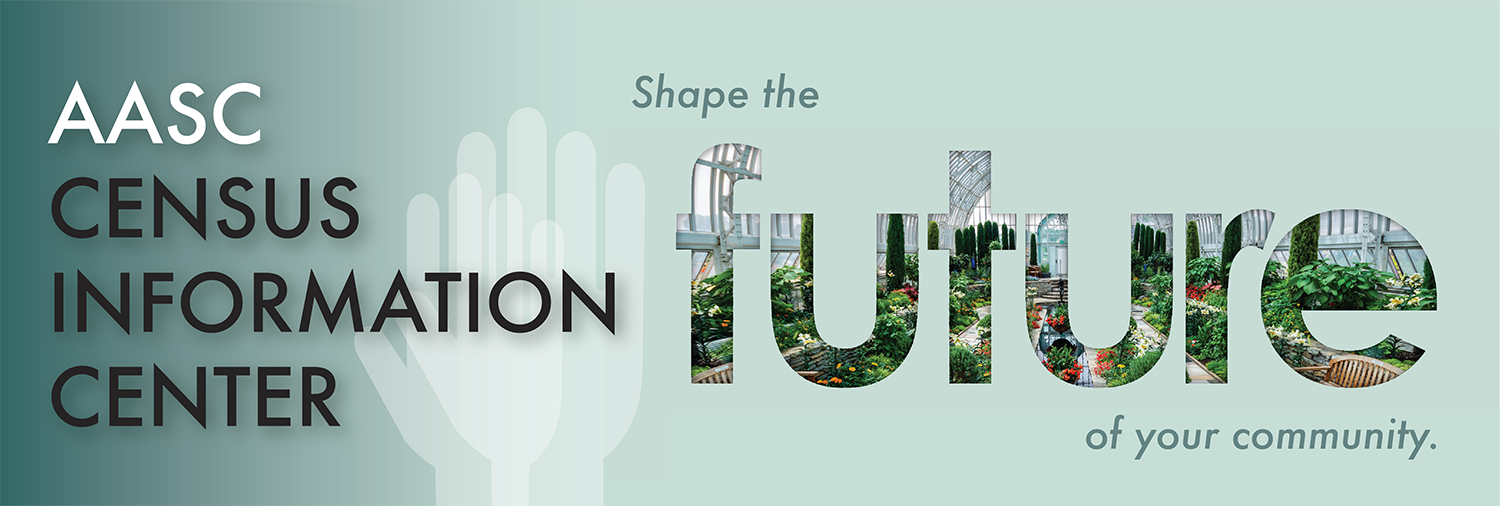
| AASC CENSUS INFORMATION CENTER |
2020 CENSUS RESOURCES | DATA & PUBLICATIONS |
As an official partner of the U.S. Census Bureau, we are playing a key role in
raising awareness that the 2020 Census is easy, safe, and important.
Learn more about why your response matters >>
Every 10 years, the federal government is legally required to count every person living in the country, regardless of citizenship status, as part of the U.S. Census.
The census is used to decide how to spend $1.5 trillion in federal funding for important services such as healthcare, schools and libraries, public transportation, welfare benefits, and much more. You can still respond online or respond by phone through August 14, 2020.
Language assistance is available for some languages. The online questionnaire and telephone assistance are available in Spanish, Vietnamese, Korean, Russian, Arabic, Tagalog, Polish, French, Haitian Creole, Portuguese, and Japanese. The Census Bureau also produced language glossaries, language identification cards, and language guides in 59 non-English languages which you can download at https://2020census.gov/en/languages.html
Ensuring a complete count means more resources for our community! Curious how we're doing? Use this tool to see how many people in our community are responding to the 2020 Census.
![]() Asian Americans, Native Hawaiians, and Pacific Islanders (AANHPI) are the fastest growing population in the United States.
Asian Americans, Native Hawaiians, and Pacific Islanders (AANHPI) are the fastest growing population in the United States.
![]() Today, roughly one in five Asian Americans and one in three Native Hawaiian and Pacific Islanders live in hard-to-count areas.
Today, roughly one in five Asian Americans and one in three Native Hawaiian and Pacific Islanders live in hard-to-count areas.
![]() Some AANHPI communities are especially at risk of being missed or undercounted, including those that have limited English skills and/or are low-income.
Some AANHPI communities are especially at risk of being missed or undercounted, including those that have limited English skills and/or are low-income.
![]() The census is the only national source of disaggregated data. Combat invisibility of our diverse communities and if you don't see your ethnicity listed, be sure to mark "Other Pacific Islander"
or "Other Asian" and write yours in.
The census is the only national source of disaggregated data. Combat invisibility of our diverse communities and if you don't see your ethnicity listed, be sure to mark "Other Pacific Islander"
or "Other Asian" and write yours in.
![]() Estimates show that for every person uncounted, California could lose $1,000 a year for 10 years. That's as much as $10,000 per person in funds lost over the next decade.
Estimates show that for every person uncounted, California could lose $1,000 a year for 10 years. That's as much as $10,000 per person in funds lost over the next decade.
Counting every person living in the United States is a massive undertaking, and efforts begin years in advance. Here's a look at some of the key dates along the way, as they are currently scheduled for 2020:
March 12 - March 20: Households received official Census Bureau mail with detailed information on how to respond to the 2020 Census online, by phone, or by mail.
April 1: This is Census Day, a key reference date for the 2020 Census—not a deadline. We use this day to determine who is counted and where in the 2020 Census. When you respond, you'll tell the Census Bureau where you live as of April 1, 2020, and include everyone who usually lives and sleeps in your home. You can respond before or after that date. We encourage you to respond as soon as you can.
April 29 - May 1: The Census Bureau will count people who are experiencing homelessness over these three days. As part of this process, the Census Bureau counts people in shelters, at soup kitchens and mobile food vans, on the streets, and at nonsheltered, outdoor locations such as tent encampments.
April 16 - June 19: Census takers will work with administrators at colleges, senior centers, prisons, and other facilities that house large groups of people to make sure everyone is counted.
May 27 - August 14: Census takers will interview homes that haven't responded to the 2020 Census to help make sure everyone is counted.
December: The Census Bureau will deliver apportionment counts to the President and Congress as required by law.
A3PCON Census English
Census Korean version
Visit 2020census.gov, countusin2020.org, and apiavote.org/census for additional information, including how to identify an official census taker, adjustments made to census operations as a result of COVID-19, how the census counts college students, and more.
In 2000, the AAPI Community Development Census Information Center became one of 52 community, regional, and national organizations to be designated a Census Information Center (CIC). The CIC network is comprised of colleges and universities, research groups, minority chambers of commerce, civil rights organizations serving children, the aging, rural populations, and tribal governments. The CIC program is a partnership between the U.S. Census Bureau and select organizations with the shared goal of providing local access, education, and technical assistance on census data for planning and decision-making by underserved communities. We provide demographic and socioeconomic data trend reports, respond to custom data requests, and offer trainings on accessing, using and interpreting census data.
For more information, please contact:
Melany De La Cruz-Viesca
Director, AAPI Community Development Census Information Center
310-825-2974 | melanyd@ucla.edu